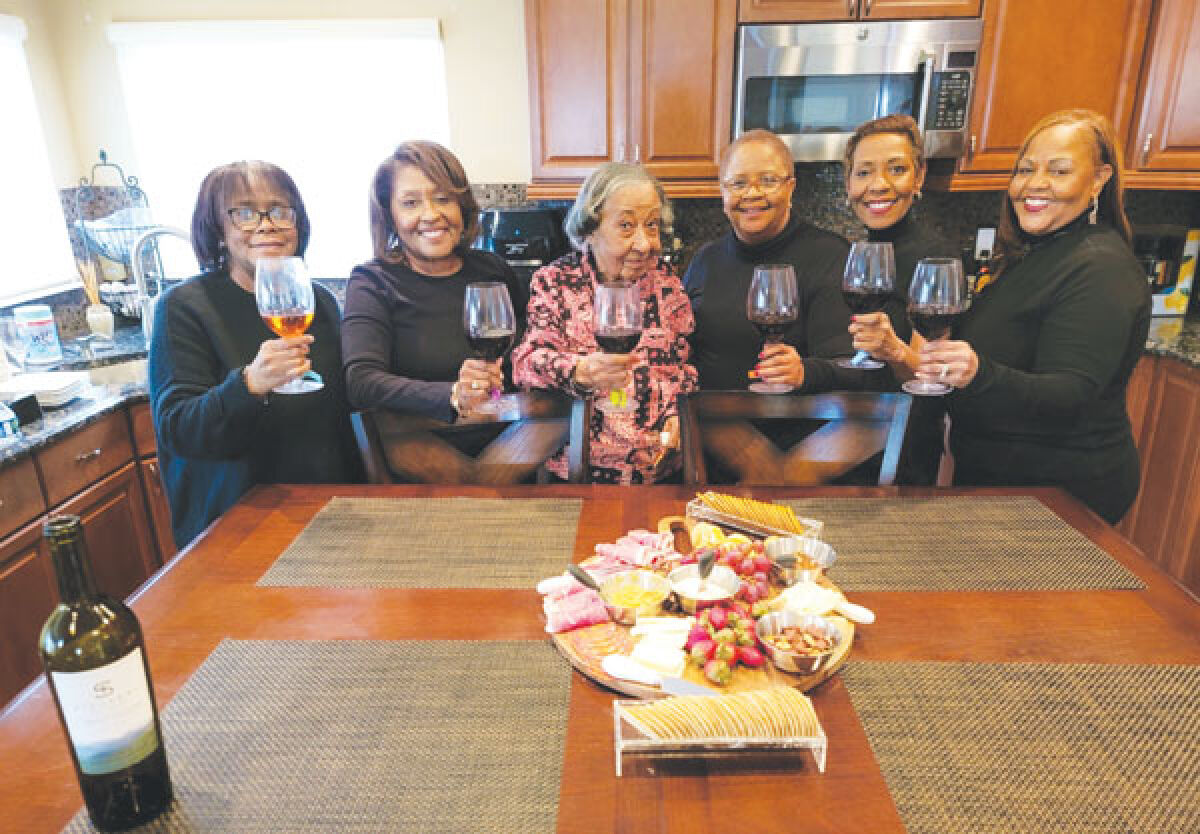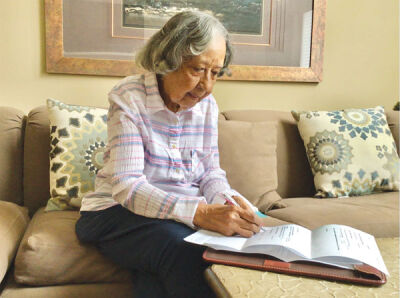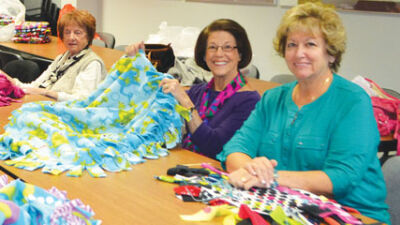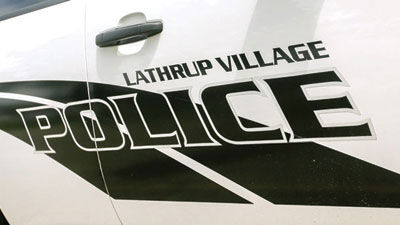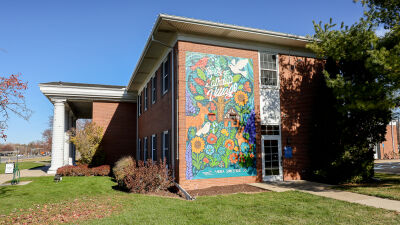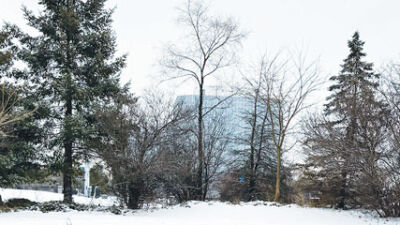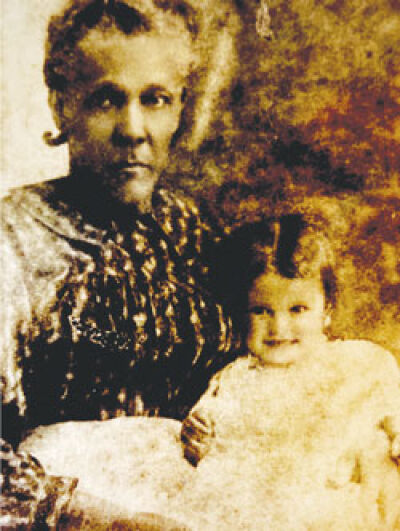
Gwendolyn Hubbard’s great-grandmother Rachel McGruder holding Hubbard’s grandmother in the early 1900s.
Photo by Gwendolyn Hubbard
SOUTHFIELD — For as long as she can remember, Gwendolyn Hubbard has always been “The Family Historian.”
Growing up, she took a special interest in her family’s lore, and her ears would perk up every time she heard her mother or aunts share a piece of the family’s history. It wasn’t until a few years ago that she and her sister, Carolyn Hubbard, were finally able to tie their family’s oral history to a trail of documents leading them to be formally invited into the Daughters of the American Revolution, an organization dedicated to preserving American history through women who share a direct lineage to an “American patriot.”
“My mother, aunts and uncles were all storytellers,” Hubbard said. “I would always ask my family questions, because it was unusual that my grandmother, Rachel, had, like, 16 or 18 kids. We were also told that it was legend that our great-great-grandfather, Charles McGruder, has over 100 kids. So, the numbers got me interested. My family started sending me documents like birth certificates, death certificates, obituaries and census records. When we decided to get into the DAR, my sister Carolyn was the one who actually did all of the research and found the majority of the documents we needed.”
DAR requires a strict vetting process to join the organization.
To become a member, one must be able to prove with proper documentation that they have an “American patriot” in their family.
Susan Hawkins is the regent of the Lathrup Village-based chapter, Three Flags, which is the chapter that Gwendolyn Hubbard, a Southfield resident, joined.
“We have to prove our lineage via documents, and these documents can be birth certificates, marriage certificates, death certificates, and as you get further back, they might be headstones, censuses and so forth back to the Revolutionary War, where you have to show record of where they fought,” Hawkins said. “You have to do the whole crux of the matter. It can’t be hearsay,”
For Black Americans, this process of finding documentation proves to be a more difficult feat.
“For the African American soldier, sometimes there’s a little bit more to it, because a lot of these gentlemen didn’t really have last names or official first names,” Hawkins said. “Their enslavement can present a different set of problems. And this is where, also, DNA can come in.”
The Hubbard sisters said that the most challenging part of proving their connection to their patriot was finding birth certificates, since many Black Americans didn’t have birth certificates before the 1900s. However, since their family had been proactive in keeping historical documents and information intact, they were able to use the multiple spellings of names to connect individuals they saw listed in censuses to their family. Carolyn was able to uncover her family’s history by scouring Google, using Ancestry.com, DNA testing and most importantly, the help of their 97-year-old Aunt Lucille, who grew up on the McGruder Plantation. Lucille Burden Osborne was able to help them fact-check anything they found. Through these engines, the Hubbard sisters connected their family’s oral history to physical documentation, finally piecing together the puzzle and uncovering the truth about their maternal side, the McGruders.
After five years of researching their family, the Hubbard sisters saw the lore they heard growing up become fact.
“We found that everything we grew up hearing was true, and that’s what was so exciting about us getting into the DAR,” Gwendolyn shared.
ABC’s series “Soul of a Nation” features African American stories, and the History Channel did an Emmy-winning episode on the McGruder family with Ms. Lucille piecing together the family’s story. Their relative, Charles McGruder, who Gwendolyn had been told had over 100 children, was called a “breeder,” meaning that it was his job to reproduce with the enslaved women. While it’s been confirmed that Charles had nearly 40 children, there is a chance there could be more who weren’t documented. After emancipation, Charles purchased 300 acres of land in Alabama for $1,500, the same price the slave owner valued him at.
The McGruder legacy lives on through the white and Black relatives who come together to recognize the complexity of their family history.
Through their connection to Charles and DNA testing, the Hubbard sisters found their patriot, Ninian Ouffit McGruder. Gwendolyn said that “90% of McGruders, both Black and white, came from Alexander McGruder, “The Immigrant.”
“We know that our patriot was a slave owner. But also, through him, our family was able to stay connected, because he actually kept our family together during a time when slaves were considered property, and many didn’t even have names. We were blessed because he kept their names listed and their documents.”
Carolyn shares that Alexander came to America as an indentured servant after getting into trouble in Scotland. After his service was up, he served in the Revolutionary War, and upon leaving, he was given some land. He had two plantations, one in Maryland and one in South Carolina. Alexander left the property to his daughter, Eleanor McGruder. During that time, women weren’t able to own property, so Eleanor married and moved to Alabama, which is how some McGruders ended up there.
The Hubbard sisters encourage those looking to learn more about their family history to be persistent in their search. Gwendolyn advises, “Start with the stories. There’s a lot that you might not know about. Start that conversation. As you get that oral history, try to link it to documents. And use DNA testing. So much of what we found was because our white relatives were willing to put their DNA out there.”
To find out more about how to research your family’s history, the Southfield Public Library is hosting an event along with the Hubbard sisters and DAR called “African American Patriot Soldiers of the American Revolution: Who They Are and How to Find Yours.” This presentation will take place 6:30-8 p.m. on Wednesday, Feb. 22. For more information, visit https://southfieldlibrary.org/calendar-of-events/#/events/oJlJfEEvnH/instances/ot6dHrwBNp/.
 Publication select ▼
Publication select ▼